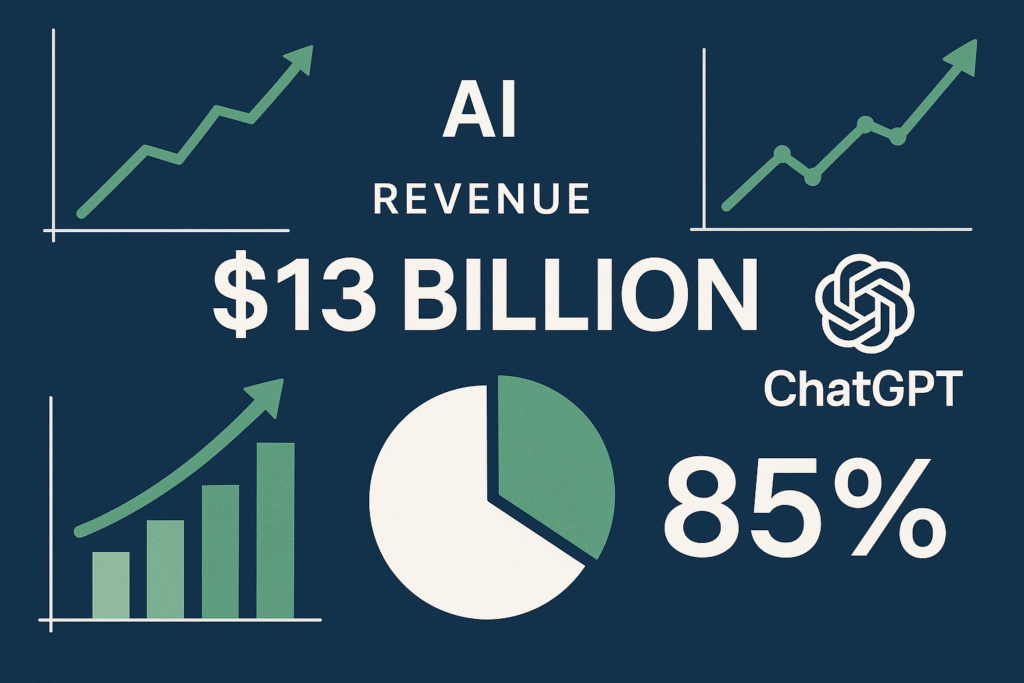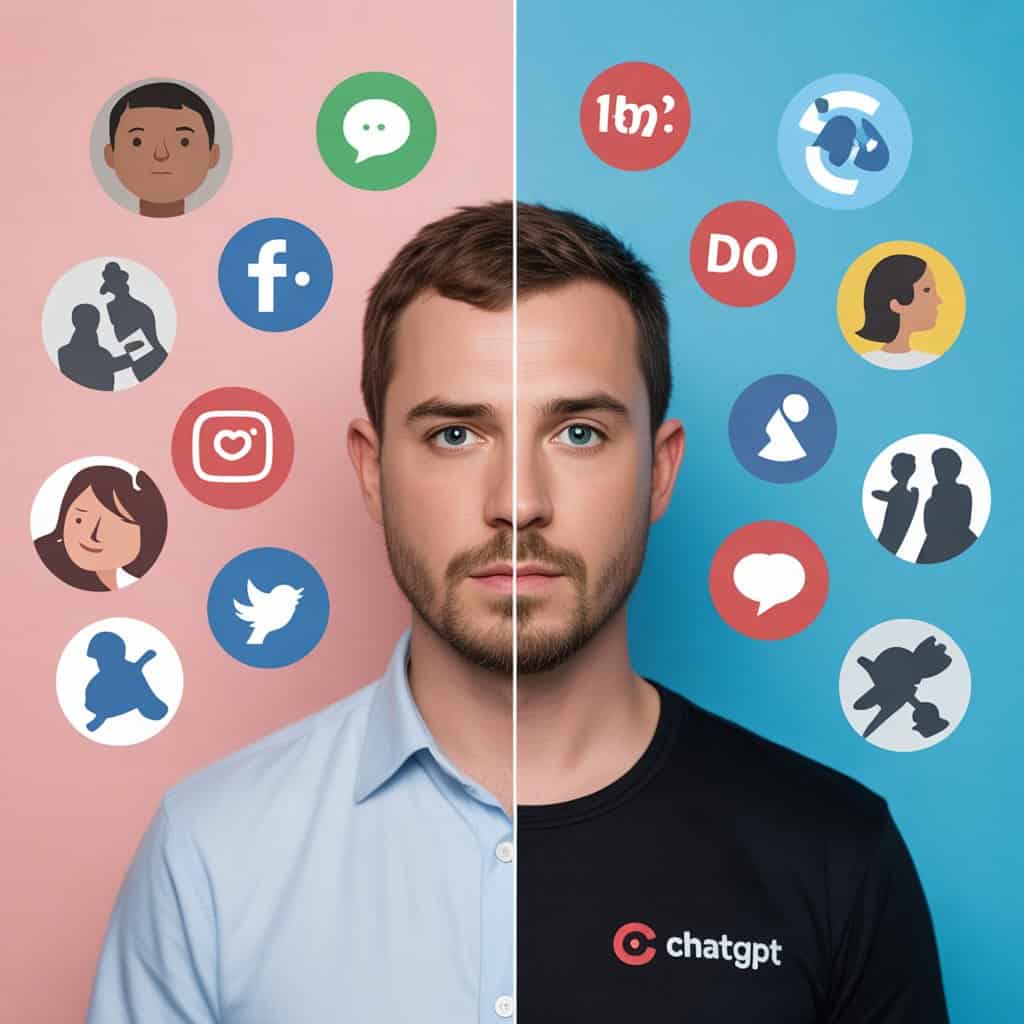The digital marketing world just got its biggest shake-up since Facebook launched business pages. OpenAI’s recent confirmation that they’re exploring ChatGPT advertising isn’t just another platform announcement, it’s a seismic shift that could redefine how we reach customers.
Here’s what matters: While everyone’s debating whether AI will replace marketers, the smart money is preparing for something bigger. ChatGPT advertising represents the first truly conversational advertising platform at scale, and the implications are staggering.
The $13 Billion Reality Check
Let’s cut through the noise. OpenAI’s CFO didn’t drop this hint casually. With annual recurring revenue hitting $13-15 billion by late 2025, they’re facing the same reality every tech giant encounters: subscription revenue has limits, but advertising scales infinitely.

The numbers tell the story. ChatGPT advertising could generate $1 billion in new revenue starting in 2026, potentially growing to $25 billion annually. That’s not speculation, that’s internal forecasting from a company that reached 100 million users faster than any consumer app in history.
But here’s what most marketers are missing: this isn’t about OpenAI’s revenue. It’s about access to 800 million weekly users who aren’t passively scrolling, they’re actively problem-solving.
Why ChatGPT Users Are Every Marketer’s Dream
Traditional advertising interrupts. ChatGPT advertising integrates.

Think about the last time you used ChatGPT. You probably asked something specific: “What’s the best project management software for remote teams?” or “How do I optimize my email marketing campaigns?” These aren’t casual browsing queries, they’re high-intent purchase signals.
Compare that to social media advertising, where you’re interrupting someone’s entertainment with your message. On ChatGPT, users come with problems they need solved. That’s not just better targeting, that’s perfect timing.
The AI advertising platform advantage becomes clear when you consider user behavior:
- Search engines show you what exists
- Social platforms show you what’s trending
- ChatGPT shows you what works for your specific situation
This contextual difference changes everything about how advertising functions.
The Three Pillars of Conversational Advertising
Based on OpenAI’s interface and existing AI platforms, ChatGPT advertising will likely operate on three core principles:
1. Sponsored Responses: Google Ads, But Conversational
Instead of clicking blue links, users will see sponsored answers integrated directly into ChatGPT’s responses. Imagine asking “best CRM for small business” and seeing a Salesforce-sponsored response before organic recommendations—but written in ChatGPT’s natural, helpful tone.
This isn’t disruptive advertising. It’s advisory advertising that feels like expert consultation.
2. Native Product Mentions: The Subtle Integration
The most powerful ChatGPT advertising format might be the most invisible. ChatGPT already references tools and services naturally in its responses. The evolution? Some of these mentions become paid placements, seamlessly woven into genuinely helpful advice.
This approach mirrors how Harvard Business Review highlights AI’s role in personalizing marketing efforts, the best AI marketing doesn’t feel like marketing at all.
3. Contextual Recommendations: Intelligence-Driven Placement
ChatGPT advertising will leverage conversation history and context in ways traditional platforms can’t match. Ask about marketing automation, and you might see HubSpot mentioned alongside technical advice, not because you searched for HubSpot, but because the AI determined it’s relevant to your specific use case.
This level of contextual intelligence represents a fundamental shift from keyword-based advertising to intent-based advertising.
The Targeting Revolution: Beyond Keywords to Conversations
Here’s where ChatGPT advertising gets interesting. Traditional digital advertising targets demographics, interests, and behaviors. AI advertising platforms target conversations.
Instead of bidding on “CRM software,” you might target conversations about “managing customer data across remote teams.” The difference? Context, specificity, and genuine intent.
OpenAI marketing strategy documents suggest targeting capabilities will include:
- Query intent: What the user is actually asking about
- Conversation context: Previous questions in the thread
- User behavior patterns: Topics they frequently discuss
- Industry focus: B2B versus consumer queries
This isn’t just better targeting, it’s targeting that understands nuance.
The Competitive Landscape: Everyone’s Scrambling
Google isn’t sitting idle. They’re already testing ads in AI Overview results, with AI Overviews appearing in over 50% of search results by June 2025. Microsoft is pushing Copilot advertising harder. Meta is accelerating AI assistant features.
ChatGPT advertising success will force every major platform to evolve their ad offerings. We’re not just looking at a new advertising channel, we’re looking at the catalyst for industry-wide transformation.
The implications extend beyond paid advertising. If ChatGPT starts citing fewer sources in favor of sponsored answers, organic content creators will need entirely new strategies to maintain visibility.
Budget Reallocation: The Coming Shift
Smart marketers are already planning budget tests. Google’s search ad revenue reached $160 billion in 2025, but some of that volume will inevitably shift as users turn to AI engines for answers.
The digital marketing revolution isn’t just about adding another channel, it’s about recognizing that user behavior is fundamentally changing. When people can get personalized, conversational answers instead of searching through multiple websites, advertising must adapt accordingly.
Early budget allocation strategies should consider:
- Testing allocation: 5-10% of search budget for initial ChatGPT advertising tests
- Channel complementarity: How ChatGPT ads work alongside existing search and social campaigns
- Attribution modeling: Longer attribution windows for conversational advertising impact
- Performance benchmarking: New KPIs for conversational engagement versus traditional click-through rates
Who Wins and Who Waits: Business Fit Analysis
ChatGPT advertising isn’t universal. The opportunity varies dramatically by business type and customer behavior.
Prime Candidates for Early Adoption:
SaaS Companies: Users frequently ask “what’s the best tool for [specific problem]?” This natural query pattern aligns perfectly with conversational advertising.
E-commerce (High-Consideration Products): Electronics, fitness equipment, B2B supplies, anything requiring research and comparison benefits from ChatGPT’s advisory approach.
Professional Services: Law, finance, healthcare, marketing industries where expertise and trust matter more than price.
Education and Training: Online courses, certifications, skill development areas where users actively seek learning solutions.
Businesses That Should Wait:
Impulse Purchase Brands: Low-cost, emotional purchase decisions don’t align with ChatGPT’s deliberative environment.
Highly Visual Products: Fashion, art, design categories where visual appeal drives decisions more than conversational advice.
Local Services: Plumbers, restaurants, hair salons, businesses serving immediate, location-specific needs.
The Preparation Playbook: Getting Ready Now
While ChatGPT advertising isn’t live yet, preparation starts today. The brands that succeed will be those building authority and optimizing for AI visibility before paid options launch.
Map Your Customer Questions
Use tools like AnswerThePublic and Google’s “People Also Ask” feature to identify questions your audience asks that could end up in ChatGPT. Your customer support logs are goldmines for this research.
The goal isn’t just identifying questions, it’s understanding the conversational context around those questions.
Develop Conversational Ad Copy
Start writing ads that sound natural in conversation. Instead of “Buy Our CRM Today!” try “For remote teams managing customer data, many companies choose [Your CRM] because it integrates seamlessly with existing workflows.”
This isn’t just different copy, it’s a different mindset about how advertising communicates value.
Audit Your Brand Authority
ChatGPT advertising will favor authoritative sources. Strengthen your presence on:
- Industry publications and news sites
- High-authority directories and review platforms
- Academic or research publications in your field
- Influential podcasts and media mentions
Authority isn’t built overnight, but every mention compounds your AI visibility.
Build Your Knowledge Base
Create comprehensive FAQ sections, detailed product documentation, and thorough how-to guides. The more authoritative content you publish, the more likely ChatGPT will reference your expertise, paid or organic.
This content strategy serves double duty: improving current SEO while positioning for future AI-powered marketing opportunities.
The Attribution Challenge: Measuring Conversational Impact
Conversational advertising breaks traditional attribution models. Users might mention your brand to colleagues, search for you later, or bookmark your website without clicking directly through ChatGPT.
Prepare for:
- Longer attribution windows: Conversational influence extends beyond immediate clicks
- Multiple touchpoint tracking: Users may research you across several platforms after ChatGPT exposure
- Brand mention monitoring: Track increases in branded search volume and direct traffic
- Conversation influence metrics: New KPIs measuring advisory impact versus transactional clicks
The measurement challenge is real, but so is the opportunity for brands that adapt their analytics approach.
Getting Featured Without Ads: The Organic Opportunity
You don’t need to wait for paid options. Brands already appear in ChatGPT responses organically, and you can improve your chances now.
Strengthen Content Authority
Focus on E-E-A-T signals (Experience, Expertise, Authoritativeness, Trustworthiness). Publish detailed guides, case studies, and research demonstrating deep knowledge in your field.
Optimize for Conversational Queries
Write content answering questions the way people actually ask them. Instead of targeting “email marketing best practices,” create content around “how to write emails that people actually open.”
Build Relevant Brand Mentions
ChatGPT values brand mentions and links from trusted sources. Earn coverage from industry publications, news sites, and authoritative blogs in your space.
Implement Structured Data
Use schema markup to help AI systems understand your content structure. FAQ schema, product schema, and organization schema all improve your chances of being referenced.
The Pricing Revolution: New Models for New Behavior
ChatGPT advertising pricing will likely blend familiar models with AI-specific innovations:
Cost-per-Click (CPC): Pay when users click sponsored links but expect higher intent and conversion rates than traditional search.
Cost-per-Engagement (CPE): Pay when users interact with your ad content within the conversation, a metric unique to conversational platforms.
Subscription Packages: Monthly fees for guaranteed mention opportunities in relevant conversations.
Performance-Based Pricing: Pay based on leads or conversions generated, possible because of ChatGPT’s high-intent user base.
The auction system will probably reward relevance over pure bid amounts, similar to Google’s Quality Score. ChatGPT won’t want to serve irrelevant ads that hurt user experience.
Industry Impact: The Ripple Effects
ChatGPT advertising success will reshape multiple industries:
Content Marketing: If ChatGPT cites fewer sources in favor of sponsored answers, content creators need new visibility strategies.
SEO: Traditional search optimization must evolve for AI-powered search experiences.
Social Media Advertising: Budget may shift from interruption-based social ads to solution-based conversational ads.
Market Research: Understanding customer questions becomes more valuable than understanding customer demographics.
The digital marketing revolution extends beyond advertising into fundamental changes in how businesses understand and reach customers.
The Global Perspective: Market Expansion
With ChatGPT’s user base spanning globally, ChatGPT advertising represents international reach from day one. Unlike platform-by-platform global expansion, conversational advertising scales across languages and cultures naturally.
This global accessibility could accelerate international business expansion for companies that master conversational advertising early.
Risk Management: What Could Go Wrong
Every new advertising platform carries risks:
User Experience Degradation: Too many ads could hurt ChatGPT’s helpfulness, driving users away.
Regulatory Scrutiny: AI advertising will face new regulations around transparency and manipulation.
Competition Intensity: Early success will attract massive advertiser competition, driving up costs.
Attribution Complexity: Measuring ROI becomes more challenging with conversational influence.
Smart marketers prepare for these challenges while capitalizing on the opportunity.
The Timeline: When and How Fast
Based on OpenAI’s development patterns and revenue pressures, expect ChatGPT advertising beta testing in early 2026, with broader rollout by mid-2026.
The rollout will likely follow this pattern:
- Limited beta with select advertisers
- Gradual expansion by industry vertical
- Full platform launch with complete targeting options
- Advanced features including automation and optimization tools
Early adopters will have 6-12 months of lower competition and higher performance before the platform matures.
Your Next Steps: The Action Plan
The ChatGPT advertising opportunity is real, but preparation determines success. Here’s your immediate action plan:

This Month:
- Audit your brand’s current AI visibility
- Map customer questions that could become ChatGPT queries
- Begin developing conversational ad copy
- Strengthen your content authority signals
Next Quarter:
- Test conversational marketing on your website
- Build comprehensive FAQ and knowledge base content
- Earn mentions from authoritative industry sources
- Prepare attribution models for conversational influence
Next Six Months:
- Monitor OpenAI announcements for beta access opportunities
- Allocate test budget for early platform adoption
- Train your team on conversational advertising principles
- Develop performance benchmarks for new ad formats
The Bottom Line: Revolution or Evolution?
ChatGPT advertising isn’t just another advertising platform, it’s the first truly conversational advertising experience at scale. The combination of 800 million high-intent users, natural language interaction, and contextual intelligence creates opportunities that don’t exist anywhere else.
The question isn’t whether ChatGPT advertising will succeed. The question is whether your business will be ready when it launches.
The brands that start preparing now, building authority, developing conversational approaches, and understanding AI-powered customer behavior will have a massive advantage when the platform goes live.
OpenAI marketing strategy documents suggest this is just the beginning. As AI becomes more sophisticated and user adoption grows, conversational advertising will become as essential as search and social advertising are today.
The digital marketing revolution is here. The only question is: will you lead it or follow it?
Ready to prepare your brand for the ChatGPT advertising revolution? Start building your AI visibility strategy today because by the time everyone else realizes the opportunity, the competitive advantage will be gone. Visit us –https://autimark.com

